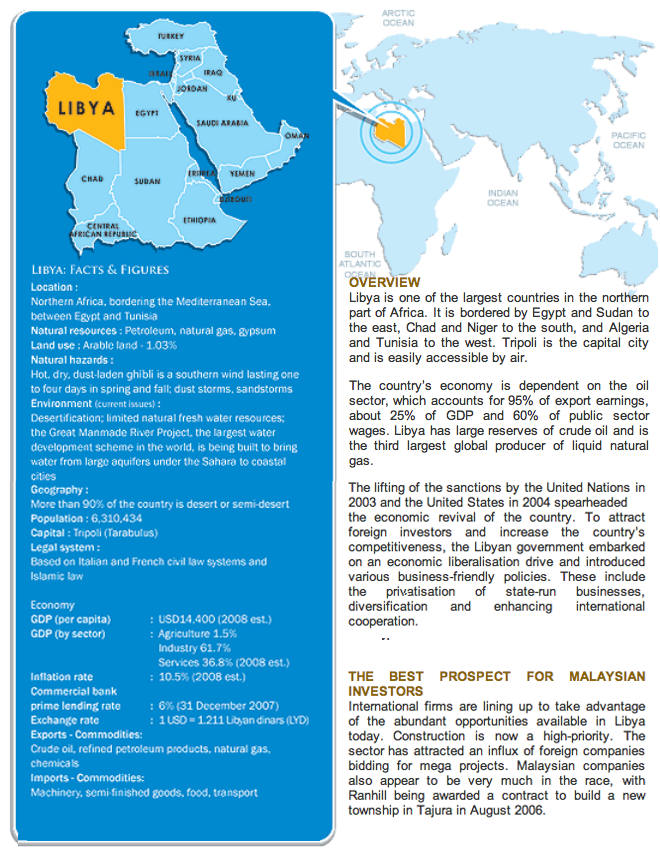Doing Business In Libya

 Tourism is also a fast growing sector as the country is blessed with natural wonders – from its beautiful beaches and magnificent desert landscapes to UNESCO World Heritage sites. Local and international investors have already committed USD2.44 billion to tourism projects, including the development of hotels and other tourism-related infrastructure.
Tourism is also a fast growing sector as the country is blessed with natural wonders – from its beautiful beaches and magnificent desert landscapes to UNESCO World Heritage sites. Local and international investors have already committed USD2.44 billion to tourism projects, including the development of hotels and other tourism-related infrastructure.
The financial sector is undergoing a major transformation. In 2007, 19% of the state-owned Sahara Bank was sold to France’s BNP-Paribas. Other Libyan banks are also being encouraged to consider strategic partnerships with foreign banks. There are plans to give licenses to foreign banks in 2010 to start operations in Libya – either in partnership with Libyan banks or independently. Reforms that have been introduced include a new law governing the independence of the central bank, the recognition of international and supervisory standards, electronic payment, and risk management technology.
The growing demand for healthcare services provides many investment opportunities. Libyans are increasingly looking to the private sector in search of better healthcare. In fact, the number of Libyan and expatriates travelling abroad for treatment is also rising. As a result, partnerships and collaborations have been flourishing throughout Libya. Education and training are essential to a policy of diversification. Neither the school system nor the higher education or vocational systems in Libya are producing the trained workforce that is needed to support a free market economy. Recognising this, the Libyan government is looking for partners to help modernise and update its numerous vocational training institutions.
SEIZING OPPORTUNITIES
The country is now reaping the benefits of its growing economy and tremendous investment potential. Foreign companies have a significant presence in the country especially in construction, tourism, real estate, property, services and banking.
The investment boom is apparent. Ongoing construction projects are everywhere, and trading and commercial activities are on the rise every day. A new law for the promotion of foreign capital investment has also created a very favourable investment climate.
Recognising the importance of a free trade area to the country’s economy, the Libyan Government developed the Misurata Free Zone (MFZ). Among the incentives offered to potential investors here are exemptions from registration requirements in the trade, import and export registry, custom duties and taxation as well as local tariff for water and power. All stocks and shares, financial exchanges and money transfers are exempted from taxes, additional charges and fees.
UNDERSTANDING THE LOCAL BUSINESS CULTURE
As far as doing business in Libya is concerned, Malaysian companies lack physical representation. In Libya’s unique business culture, deals are normally sealed based on the strength of the personal relationship between locals and their prospective foreign partners.
Potential investors should enter the Libyan market with an understanding that the overall business process may take longer than expected. Successes in small and less significant projects will eventually lead to bigger deals. In economic diplomacy, it is not only numbers that matter but the strength of soft diplomacy, i.e. establishing personal contacts and a good rapport will help ensure a win-win outcome for all. It is imperative for Malaysian businessmen to note that understanding these cultural differences is the key to successful business negotiations in Libya.

